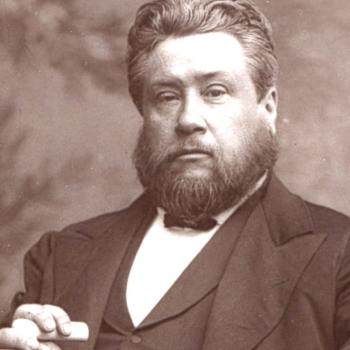* * * * * * *
First, let’s summarize the points Lloyd-Jones has made in our previous posts:
(1) One cannot be a Christian unless the Holy Spirit is in him. (1 Corinthians 12:3, Romans 8:9).
(2) Sealing means that which authenticates us as sons of God. (It doesn’t make us sons.)
(3) Sealing goes beyond our possession of the Spirit’it is additional.
(4) It is God’s action’something that is done to the believer.
Last week we looked at the Doctor’s discussion of ‘sealing’ from a negative perspective. In today’s quotes, he takes a strikingly positive approach. His focus is pointedly on the ‘experimental’ aspect of sealing’that it is an experience.
‘I emphasize that for the reason that most of the books which have been written on the Holy Spirit during this present century go out of their way to emphasize that the sealing of the Holy Spirit is not experimental, and has nothing to do with experience as such. They state this quite categorically . . . .’
MLJ explains ‘why’ writers in the past century have emphasized the non-experimental nature of the baptism of/with the Holy Ghost. It is based, he says, on their understanding of 1 Corinthians 12:13: ‘For by one Spirit have we all been baptized into one body.’ Their conclusion, says the Doctor, is that this verse is a reference to the baptism of the Holy Spirit and ‘therefore they conclude that the baptism of the Holy Spirit clearly refers to the action of God in which He incorporates us into the body of Christ. It is therefore an action of God which applies to all believers in which they are quite unconsciously incorporated into the body of Christ.’
The difficulty, he says, lies with the word ‘baptism’ and their assumption ‘that wherever the words ‘Spirit’ and ‘baptism’ are found in the same statement the meaning must always be the same . . . .’ But, he says, ‘The fallacy here is surely due to the failure to realize that the word ‘baptize’ is used in many different ways in Scripture.’ He cites as an example how the term ‘baptism of fire’ is often used to refer to a soldier’s first battle experience, and he also refers to a statement by Jesus in Luke 12:50, ‘But I have a baptism to be baptized with; and how am I straitened until it be accomplished!’ Jesus is obviously not referring to water baptism, but to His approaching trial and death.
‘There are many different particular usages with regard to this word ‘baptism’, and the statement in 1 Corinthians 12:13 is but one of them. We are all placed into the realm of Christ by the Holy Spirit and into His body which is the Church . . . . But it does not follow that that is the only possible meaning of the expression ‘baptized with the Holy Ghost.’
‘It is common ground to say that the sealing with the Spirit and the baptism with the Spirit are the same.’ Yet the Doctor exclaims how incredulous it is to him to be asked, after reading the account of Pentecost as described in Acts, chapter 2, to believe that this baptism is not experimental:
‘. . . in spite of the account of the event given there [in Acts] I am asked to believe that it is non-experimental, that it did not lead to any feelings or to anything whatsoever in the sphere of consciousness. Such a suggestion is almost unthinkable. Baptism, I am told, is something that God does to me of which I am unconscious. I am a member of the body of Christ, but am not aware of anything happening, it is an action that God takes. Does this tally with the account of what happened on the day of Pentecost at Jerusalem? Would something which is non-experimental and outside the realm of consciousness so affect people as to make onlookers say, ‘These men are full of new wine’? Would it explain the way in which the Apostles spoke in other tongues, when Peter preached with power and authority and boldness? How slavish we can become in our use of terms! And how we rob ourselves of the blessings of God as a result! We are so afraid of excesses, we are so afraid of being labeled in a certain way, that we claim the baptism of the Spirit to be something unconscious, non-experimental, a happening that does not affect a man’s feelings.
‘Such an argument is utterly unscriptural. Not conscious! The Apostles were . . . in a state of ecstasy. They were rejoicing, they were praising God; they were moved, their hearts were ravished; they experienced things which they had never felt or known before. They were transformed, and were so different that you can scarcely recognize them as the same Peter and James and John . . . . Not experimental! Nothing can be more experimental; it is the height of Christian experience.’
Lloyd-Jones shows how this observation is repeated many times in Acts’the Samaritans in Acts 8; in the case of Paul himself, who believed on the Damascus road, but received the Spirit three days later; the experience of Cornelius, which the Doctor tells us was highly experimental and forcibly portrayed in Acts 15; Peter bearing witness after his housetop experience in Joppa ‘(How could I refuse them, after) God which knoweth the heart bare them witness, giving them the Holy Ghost even as He did unto us?); Paul in Acts 19 questioning the ‘disciples’ on whether they had yet received the Holy Ghost. But the most convincing proof, says MLJ, is found in the question put by Paul to the Galatians in chapter 3: ‘Received ye the Holy Ghost by the works of the law or by the hearing of faith?’ (v. 2).
‘Had they received this baptism with the Holy Ghost by the works of the law or by the hearing of faith? How can anyone answer that question if this is something outside the realm of experience? How can I know whether I have or have not received the Spirit if it is not something experimental? All these quotations from Scripture clearly contradict the unfortunate interpretation which appeared somewhere towards the end of the last century, and which seems to have been a kind of incubus upon interpretation ever since.
‘But if we go back into the history of the Church before that time we find a great richness in the exposition of our present theme . . . the names of Thomas Goodwin and John Owen, the Puritans; also those of Charles Hodge and Charles Simeon. I can also claim the support of John Wesley and George Whitefield. The sealing with the Sprit, or the baptism with the Spirit, is clearly experimental and experiential.’
In the next section of his exposition, the Doctor describes exactly what he is talking about when he tells us that this is an experience. The best answer, he says, is found in Romans 8:16”The Spirit himself beareth witness with our spirit that we are the children of God’, and in Galatians 4:6”And because ye are sons, God hath sent forth the Spirit of his Son into your hearts, crying, Abba, Father.’ Also, he points us to Paul’s argument concerning ‘the heir’ in Galatians 4:1-2:
‘Though that little boy is actually the heir of a great estate, because he is still only a boy he does not manage the estate, and he is not conscious of his own importance and dignity and of all that belongs to him. He must spend most of his time with tutors . . . they keep him in his place, and he may even be afraid of them. He is virtually like a servant because they seem to be lording it over him.’
‘Looking at the argument . . . in greater detail, we find that the word which is translated ‘crying, Abba, Father’ is most interesting. The Greek word for ‘crying’ is extremely old. Its original meaning is the ‘croaking of a raven’. It was used to express any kind of elemental cry that came up out of the heart, somethin
g that is not always characterized by dignity or felicity of expression; it goes much deeper than that! It is the heart cry of a child, a cry that results from a relationship, the cry of a child who is pleading with his father.
‘It is most interesting and helpful to note that this selfsame word is used [in Mark 14:36 when Jesus] was in the garden of Gethsemane, and prayed saying ‘Abba, Father, all things are possible unto thee; take away this cup from me: nevertheless not what I will, but what thou wilt’ . . . Our Lord in His terrible agony, sweating great drops of blood, shows His realization of His filial relationship to his Father in a striking manner.’
Paul tells us in Galatians 4, says MLJ, ‘that as the result of the work of Christ and this baptism of the Spirit we also are given the Spirit that was in Christ, and He makes us also cry ‘Abba, Father’. We have become certain of God as Father, we know Him as Father. We no longer believe in God as Father theoretically, it is the cry of the heart, an elemental, instinctive cry that comes welling up from the depths. That is the result of the sealing of the Spirit.’
Lloyd-Jones continues:
‘We can explain it further by saying that the peculiar blessing given to the Christian differentiates him from the Old Testament saints . . . all of them were children of God much as we are. If we are not clear about that, we will be confused everywhere. But Paul . . . argues thus: ‘If ye are Christ’s then are ye Abraham’s seed and heirs according to the promise.’ (Galatians 3:29)’
Similarly, the Doctor reminds us that a special message was given to the Apostle Paul to announce that the Gentiles were to be ‘fellow heirs’ with those Jews already belonging to the kingdom of God:
‘We can therefore look at the difference which the sealing of the Spirit makes in the following way. The saints under the Old Testament dispensation, and also the Apostles as believers and children of God before the day of Pentecost, were not only believers, but also children of God. But, so far, they were like servants, they were under tutors, they lacked a true realization of their position, they were not able to cry, ‘Abba, Father’ . . . But once they were baptized with the Spirit, when the ‘sealing’ came, they cried ‘Abba, Father’ because God had poured into their hearts this Spirit of adoption, the Spirit of His own Son . . . They had believed in our Lord and His salvation before, but now they were bubbling over with it and rejoicing in it with ‘a joy unspeakable and full of glory’. Yet we are told by many evangelical teachers that it is not experimental!
‘This, then, is what is meant by the promise of the Spirit by the Father. It is ‘the Spirit of adoption’, ‘the Spirit of sonship’; not the fact that we are sons, but our realization of it. In other words, this sealing is that direct assurance which the Holy Spirit gives us of our relationship to God in Jesus Christ.’
The Doctor ends with some writings and experiences from Thomas Goodwin, John Wesley, John Flavel, Jonathan Edwards, D. L. Moody, Christmas Evans, and George Whitefield. Among them are these:
Thomas Goodwin, quoted by MLJ, writes, ‘There is a light that cometh and overpowereth a man’s soul and assureth him that God is his and he is God’s, and that God loveth him from everlasting . . .It is a light beyond the light of ordinary faith . . . It is the next thing to heaven; you have no more, you can have no more, until you come thither’. ‘It is,’ says Lloyd-Jones, ‘more than your belief of the Scripture and all the arguments you can deduce . . . It is the electing love of God brought home to the soul.’
John Wesley, again from Lloyd-Jones, ‘It is something immediate and direct, not the result of reflection or argumentation’.
The Doctor relates an experience as described by John Flavel’
‘Thus going on his way his thoughts began to swell and rise higher and higher like the waters in Ezekiel’s vision till at last they became an overflowing flood. Such was the intention of his mind, such the ravishing tastes of heavenly joys, and such the full assurance of his interest therein, that he utterly lost sight and sense of this world and all the concerns thereof, and for some hours he knew no more where he was than if he had been in a deep sleep upon his bed.’ Arriving in great exhaustion at a certain spring ‘he sat down and washed, earnestly desiring, if it were God’s pleasure, that it might be his parting place from this world. Death had the most amiable face in his eye that ever he beheld, except the face of Jesus Christ which made it so, and he could not remember, though he believed himself dying, that he had one thought of his dear wife or children or any other earthly concernment. On reaching his Inn the influence still continued, banishing sleep. Still, still the joy of the Lord overflowed him, and he seemed to be an inhabitant of the other world. He many years after called that day one of the days of heaven, and said that he understood more of the light of heaven by it than by all the books he ever read or discoveries he ever had entertained about it.”
Lloyd-Jones ends with this statement:
‘It is almost incredible that any should say that ‘the sealing with the Sprit’ is non-experimental, and so rob themselves of such experiences. Has your heart been ravished? Have you known this overwhelming experience of the love of God? Let every man examine himself.’
All emphasis is mine.
All quotes are from D. Martyn Lloyd-Jones, An Exposition of Ephesians 1, ‘God’s Ultimate Purpose,’ Baker Books, Grand Rapids, Michigan, 1978, chapter 23, pp. 266-278.
Related posts
‘ MLJ Monday ‘ Sealed with the Spirit #2
‘ MLJ Monday ‘ Sealed with the Spirit #1
‘ 2000 posts and a big thank you to The Doctor
‘ Martyn Lloyd-Jones on the vital place of joy in the Holy Spirit
‘ More from Lloyd-Jones on the baptism of the Spirit
‘ Lloyd-Jones on Baptism with the Holy Spirit
‘ Apostles are meant for today
‘ Has the Holy Spirit rushed on you?
‘ What is a reformed Charismatic?
‘ Its all about you Jesus……calvinism and worship












